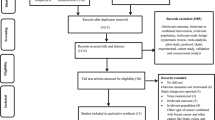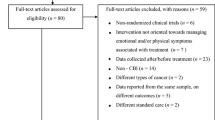Abstract
Purpose
While the rate of survival has increased in the past decade, the diagnosis of breast cancer is an extremely stressful experience for patients and it is associated with the manifestation of several psychological problems. To examine the effect of a group cognitive behavioral therapy (CBT) on the quality of life and emotional disturbance of women with breast cancer.
Methods
The study was a randomized controlled clinical trial. Samples were 48 women who had been diagnosed with breast cancer and had undergone mastectomy and chemotherapy. Study variables were measured before and after the intervention and 1 month after the end of the intervention as a follow-up. Controls received nothing and were just followed-up. Repeated measure ANOVAs were used to compare the effectiveness of the intervention on the study variables.
Results
The results of 32 women were analyzed. The increase in quality of life scores was significantly higher in the intervention group compared to the control group (P < 0.05). There were also significantly lower changes in the depression, anxiety, and stress scores of the intervention group (P < 0.05). However, the changes in the score of death anxiety were not significantly lower in the intervention group in comparison to controls (P > 0.05).
Conclusion
Group cognitive behavioral therapy was effective in the improvement of quality of life and decreases some aspects of emotional disturbance. Findings of this study suggest that women with breast cancer can benefit from group CBT. Yet, some aspects of the mental health of these women may need more attention and individualized methods.
Trial registration
ClinicalTrials.gov Identifier: IRCT20100911004728N4

Similar content being viewed by others
Data availability
All data will be available on request. Everyone can request the data. To gain access, data requestors will need to sign a data access agreement. The data is available for any purpose. All applications should be sent to Ranjbar.h@iums.ac.ir. All requests will be answered within a maximum of 1 month by email.
References
Momenimovahed Z, Salehiniya H (2019) Epidemiological characteristics of and risk factors for breast cancer in the world. Breast Cancer (Dove Med Press) 11:151–164. https://doi.org/10.2147/BCTT.S176070
Dolatkhah R, Somi MH, Jafarabadi MA, Hosseinalifam M, Sepahi S, Belalzadeh M et al (2020) Breast cancer survival and incidence: 10 years cancer registry data in the northwest. Iran Int J Breast Cancer 2020:1963814. https://doi.org/10.1155/2020/1963814
Jafari A, Goudarzian AH, Bagheri NM (2018) Depression in women with breast cancer: a systematic review of cross-sectional studies in Iran. Asian Pac J Cancer Prev 19(1):1–7. https://doi.org/10.22034/APJCP.2018.19.1.1
Yoshimura A, Ito H, Nishino Y, Hattori M, Matsuda T, Miyashiro I et al (2018) Recent improvement in the long-term survival of breast cancer patients by age and stage in Japan. J Epidemiol 28(10):420–427. https://doi.org/10.2188/jea.JE20170103
Brandão T, Schulz MS, Matos PM (2017) Psychological adjustment after breast cancer: a systematic review of longitudinal studies. Psychooncology 26(7):917–926
Brown LC, Murphy AR, Lalonde CS, Subhedar PD, Miller AH, Stevens JS (2020) Posttraumatic stress disorder and breast cancer: risk factors and the role of inflammation and endocrine function. Cancer 126(14):3181–3191. https://doi.org/10.1002/cncr.32934
Chirico A, Lucidi F, Merluzzi T, Alivernini F, Laurentiis M, Botti G et al (2017) A meta-analytic review of the relationship of cancer coping self-efficacy with distress and quality of life. Oncotarget 8(22):36800–36811. https://doi.org/10.18632/oncotarget.15758
Borstelmann NA, Rosenberg S, Gelber S, Zheng Y, Meyer M, Ruddy KJ et al (2020) Partners of young breast cancer survivors: a cross-sectional evaluation of psychosocial concerns, coping, and mental health. J Psychosoc Oncol 38(6):670–686. https://doi.org/10.1080/07347332.2020.1823546
Kocan S, Gursoy A (2016) Body image of women with breast cancer after mastectomy: a qualitative research. J Breast Health 12(4):145–150. https://doi.org/10.5152/tjbh.2016.2913
Rezaei M, Elyasi F, Janbabai G, Moosazadeh M, Hamzehgardeshi Z (2016) Factors influencing body image in women with breast cancer: a comprehensive literature review. Iran Red Crescent Med J 18(10):e39465. https://doi.org/10.5812/ircmj.39465
Pursche T, Bauer J, Hammersen F, Rody A, Waldmann A, Fischer D (2019) Early-onset breast cancer: effect of diagnosis and therapy on fertility concerns, endocrine system, and sexuality of young mothers in Germany. Breast Care (Basel) 14(1):23–29. https://doi.org/10.1159/000488795
Yamani Ardakani B, Tirgari B, Roudi RO (2020) Body image and its relationship with coping strategies: the views of Iranian breast cancer women following surgery. Eur J Cancer Care (Engl) 29(1):e13191. https://doi.org/10.1111/ecc.13191
Hashemi-Ghasemabadi M, Taleghani F, Kohan S, Yousefy A (2017) Living under a cloud of threat: the experience of Iranian female caregivers with a first-degree relative with breast cancer. Psychooncology 26(5):625–631. https://doi.org/10.1002/pon.4198
Turk KE, Yilmaz M (2018) The effect on quality of life and body image of mastectomy among breast cancer survivors. Eur J Breast Health 14(4):205–210. https://doi.org/10.5152/ejbh.2018.3875
Flitcroft K, Brennan M, Spillane A (2017) Women’s expectations of breast reconstruction following mastectomy for breast cancer: a systematic review. Support Care Cancer 25(8):2631–2661. https://doi.org/10.1007/s00520-017-3712-x
Fouladi N, Pourfarzi F, Dolattorkpour N, Alimohammadi S, Mehrara E (2018) Sexual life after mastectomy in breast cancer survivors: a qualitative study. Psychooncology 27(2):434–441. https://doi.org/10.1002/pon.4479
Sun H, Huang H, Ji S, Chen X, Xu Y, Zhu F et al (2019) The efficacy of cognitive behavioral therapy to treat depression and anxiety and improve quality of life among early-stage breast cancer patients. Integr Cancer Ther 18:1534735419829573
Qiu H, Ren W, Yang Y, Zhu X, Mao G, Mao S et al (2018) Effects of cognitive behavioral therapy for depression on improving insomnia and quality of life in Chinese women with breast cancer: results of a randomized, controlled, multicenter trial. Neuropsychiatr Dis Treat 14:2665–2673. https://doi.org/10.2147/NDT.S171297
Beatty L, Koczwara B, Wade T (2016) Evaluating the efficacy of a self-guided web-based CBT intervention for reducing cancer-distress: a randomised controlled trial. Support Care Cancer 24(3):1043–1051. https://doi.org/10.1007/s00520-015-2867-6
Xiu D, Fung YL, Lau BH, Wong DFK, Chan CHY, Ho RTH et al (2020) Comparing dyadic cognitive behavioral therapy (CBT) with dyadic integrative body-mind-spirit intervention (I-BMS) for Chinese family caregivers of lung cancer patients: a randomized controlled trial. Support Care Cancer 28(3):1523–1533. https://doi.org/10.1007/s00520-019-04974-z
Heckler CE, Garland SN, Peoples AR, Perlis ML, Shayne M, Morrow GR et al (2016) Cognitive behavioral therapy for insomnia, but not armodafinil, improves fatigue in cancer survivors with insomnia: a randomized placebo-controlled trial. Support Care Cancer 24(5):2059–2066. https://doi.org/10.1007/s00520-015-2996-y
Sethi R, Rodin G, Hales S (2020) Psychotherapeutic approach for advanced illness: managing cancer and living meaningfully (CALM) therapy. Am J Psychother 73(4):119–124. https://doi.org/10.1176/appi.psychotherapy.20190050
Naeem F, Latif M, Mukhtar F, Kim YR, Li W, Butt MG et al (2020) Transcultural adaptation of cognitive behavioral therapy (CBT) in Asia. Asia Pac Psychiatry. https://doi.org/10.1111/appy.12442
Penedo FJ, Antoni MH, Moreno PI, Traeger L, Perdomo D, Dahn J et al (2018) Study design and protocol for a culturally adapted cognitive behavioral stress and self-management intervention for localized prostate cancer: the Encuentros de Salud study. Contemp Clin Trials 71:173–180. https://doi.org/10.1016/j.cct.2018.06.010
Simonton OC, Matthews-Simonton S, Sparks TF (1980) Psychological intervention in the treatment of cancer. Psychosomatics 21(3):226–227, 231–233. https://doi.org/10.1016/s0033-3182(80)73697-6
Sahebi A, Asghari MJ, Salari RS (2005) Validation of depression anxiety and stress scale (DASS-21) for an Iranian population. J Scientific Journal Management System 1(4):36–54
Shahidi J, Khodabakhshi R, Gohari MR, Yahyazadeh H, Shahidi N (2008) McGill Quality of life questionnaire: reliability and validity of the Persian version in Iranian patients with advanced cancer. J Palliat Med 11(4):621–626. https://doi.org/10.1089/jpm.2007.0173
Nia HS, Ebadi A, Lehto RH, Mousavi B, Peyrovi H, Chan YH (2014) Reliability and validity of the persian version of templer death anxiety scale-extended in veterans of Iran-Iraq warfare. Iran J Psychiatry 8(4):29
Hummel SB, van Lankveld J, Oldenburg HSA, Hahn DEE, Kieffer JM, Gerritsma MA et al (2017) Efficacy of internet-based cognitive behavioral therapy in improving sexual functioning of breast cancer survivors: results of a randomized controlled trial. J Clin Oncol 35(12):1328–1340. https://doi.org/10.1200/JCO.2016.69.6021
Peoples AR, Garland SN, Perlis ML, Savard J, Heckler CE, Kamen CS et al (2017) Effects of cognitive behavioral therapy for insomnia and armodafinil on quality of life in cancer survivors: a randomized placebo-controlled trial. J Cancer Surviv 11(3):401–409. https://doi.org/10.1007/s11764-017-0597-0
Shahed S, Vanaki Z, Tahmasebi M (2016) Effect of an educational-supportive program based on Roy adaptation model on marital satisfaction in mastectomy patients receiving chemotherapy. Evidence Based Care 6(1):71–78
Zielazny P, Zielinska P, de Walden-Galuszko K, Kuziemski K, Betkowska-Korpala B (2016) Psychooncology in Poland. Psychiatr Pol 50(5):1065–1073. https://doi.org/10.12740/PP/60906
Wojtyna E, Życińska J, Stawiarska P (2007) The influence of cognitive-behaviour therapy on quality of life and self-esteem in women suffering from breast cancer. Rep Pract Oncol Radiother 12(2):109–117. https://doi.org/10.1016/S1507-1367(10)60047-8
Greer JA, Traeger L, Bemis H, Solis J, Hendriksen ES, Park ER et al (2012) A pilot randomized controlled trial of brief cognitive-behavioral therapy for anxiety in patients with terminal cancer. Oncologist 17(10):1337–1345. https://doi.org/10.1634/theoncologist.2012-0041
Zhang M, Huang L, Feng Z, Shao L, Chen L (2017) Effects of cognitive behavioral therapy on quality of life and stress for breast cancer survivors: a meta-analysis. Minerva Med 108(1):84–93. https://doi.org/10.23736/s0026-4806.16.04528-6
Daniels S (2015) Cognitive behavior therapy for patients with cancer. J Adv Pract Oncol 6(1):54–56
Høifødt RS, Strøm C, Kolstrup N, Eisemann M, Waterloo K (2011) Effectiveness of cognitive behavioural therapy in primary health care: a review. Fam Pract 28(5):489–504. https://doi.org/10.1093/fampra/cmr017
Arab M, Bernstein C, Haghshenas A, Ranjbar H (2020) Factors associated with caregiver burden for mothers of children undergoing Acute Lymphocytic Leukemia (ALL) treatment. Palliat Support Care 18(4):405–412. https://doi.org/10.1017/s1478951519000853
Hatamizadeh M, Hosseini M, Bernstein C, Ranjbar H (2019) Health care reform in Iran: implications for nurses’ moral distress, patient rights, satisfaction and turnover intention. J Nurs Manag 27(2):396–403. https://doi.org/10.1111/jonm.12699
Acknowledgements
The authors would like to thank the research deputy of Islamic Azad University of Medical Sciences in supporting this research. Also, they would like to thank all patients who participated in the study.
Author information
Authors and Affiliations
Contributions
H.R., F.J., E.R.D., and H.R. wrote the manuscript draft. F.J., E.R.D., and Sh.Sh. designed the study. F.J. and E.R.D. conducted the intervention. H.R. conducted statistical analyses. All authors reviewed the final manuscript.
Corresponding author
Ethics declarations
Conflict of interest
The authors declare that they have no conflict of interest.
Ethics approval
This study protocol was approved by the Ethics Committee of the University of Social Welfare and Rehabilitation Sciences (IR.USWR.REC.1394.159). A written informed consent which was approved by the Ethics Committee was obtained from each patient. The trial protocol is also registered in the Iranian Clinical Trial registry system (IRCT2015101924608N1). Furthermore, at the end of the study period, the same CBT intervention was performed for women who were assigned to the control group.
Additional information
Publisher’s note
Springer Nature remains neutral with regard to jurisdictional claims in published maps and institutional affiliations.
Supplementary Information
Below is the link to the electronic supplementary material.
Rights and permissions
About this article
Cite this article
Jelvehzadeh, F., Dogaheh, E.R., Bernstein, C. et al. The effect of a group cognitive behavioral therapy on the quality of life and emotional disturbance of women with breast cancer. Support Care Cancer 30, 305–312 (2022). https://doi.org/10.1007/s00520-021-06421-4
Received:
Accepted:
Published:
Issue Date:
DOI: https://doi.org/10.1007/s00520-021-06421-4




